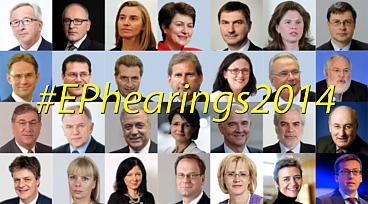Behind the scenes in Brussels
Behind the scenes in Brussels
During the next two weeks the European Parliament will be holding hearings for each of the candidates for the European Commission. In the media you’ll be hearing mostly about the candidates who face difficulties, such as the Spaniard Miguel Arias Cañete, who is to take responsibility for climate and energy policy, but who was until recently himself up to his ears in oil, at least as far as his share portfolio is concerned. What you won’t hear about so readily is what goes on in the back rooms. Business conducted there is just as important for the future.

Photo European Parliament cc-by-nc-nd
In the political groups in Brussels there have been some real battles. Who can put a question on behalf of the group? What are we trying to achieve with our questions? In our group, the United Left (GUE/NGL), a loose confederacy of national parties, each party can devise its own questions, but even then there’s a scrap over how many minutes of the speaking time allocated to the group as a whole each will get. In other groups there is a tighter coordination. The hearings therefore also give a good insight afforded by knowing which MEPs get to speak – as those posing questions are more important than the ‘backbenchers’) – as well as into what the groups see as their priority issues.
Less transparent are the agreements which can be made with candidates even before the hearings have begun. All of the candidates visit the spokespeople and presidents of the political groups and in one-to-one meetings you can tempt them into making commitments. As spokesman for the GUE/NGL on the Internal Market Committee and the Budgetary Control Committee, I have received visits to my office from several candidates. In each meeting I have brought up the SP’s priorities, such as the need to reduce interference from Brussels, testing EU legislation for their social effects – such as increasing divisions of wealth in society – and the need for more attention to be paid to the interests of small businesses and to transparency. In all of these areas I have been given promises which I tuck neatly away (there were always witnesses present) and of which I shall remind the candidates once they are appointed.
The MEPs will also of course attempt to extract commitments from the candidates during the hearings themselves, just as they did at the time with Juncker, the new Commission president, who promised to make the lobby register obligatory for lobbyists in Brussels. Most promises, however, will be made behind the scenes.
The corridors and back rooms are also important when it comes to weak candidates. Of course it matters how you conduct yourself during the hearings. Whether a candidate is refused or not, however, is a matter of horse-trading among the major political groups. If a centre-right candidate of the biggest group, the European People’s Party (EPP) has a hard time, then a social democrat or liberal will, you can bet, also find things difficult. The hearings themselves, therefore, don’t tell you everything. What matters is the written evaluation afterwards and in these, every word is negotiated behind closed doors until agreement is reached.
The coming two weeks will be tense, but more so behind the scenes than up on the stage in full view. I’m curious to find out whether the media will succeed in looking behind the scenes.
- See also:
- Dennis de Jong
